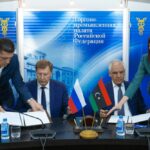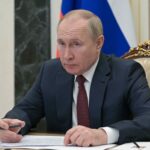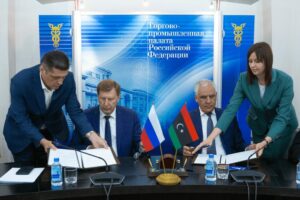A number of Sudanese citizens are unable to escape fighting in their country because their passports are locked inside European embassies.
The BBC has spoken to several people whose passports were being processed for European visas when war broke out.
Western diplomats evacuated without giving the passports back and now the embassies are closed.
Spain’s foreign ministry urged people to obtain travel documents from the Sudanese authorities.
Rami Badawi, 29, told the BBC he had been stranded in Khartoum because the French embassy had refused to return his passport. Mr Badawi works at the Sudan offices of a French technology company. His passport was at the embassy because he was applying for a visa for a business trip to France.
“I want to leave but I can’t,” he said.
Mr Badawi contacted the French embassy after the fighting broke out, asking if he could come and collect his passport. But he says they did not reply to his emails.
The French embassy has not responded to the BBC’s request for comment.
“They started their evacuation and left without any communication.”
Speaking to the BBC on Sunday evening, he said he was angry and afraid: “I can hear the sound of guns from morning till night”.
His mother, father, and siblings have their passports and they planned to travel by bus to Egypt. They faced the agonising decision of whether to leave without him, but the whole family decided to stay in Khartoum rather than leave him there alone.
The main available routes out of Sudan are currently to take a bus to the northern border and cross into Egypt, or to travel to the coastal city of Port Sudan and take a boat across the Red Sea to Saudi Arabia. Thousands of people have also fled to neighbouring Chad, which is struggling to provide people with food, water or accommodation.

Mohamed Elfadil, 30, told the BBC he had been planning a holiday to Spain and was waiting for his visa when the war broke out.
He says when he phoned the emergency number for the Spanish embassy in Khartoum to ask for his passport back, “the woman who answered asked me ‘are you Sudanese or Spanish?’ When I told her I was Sudanese she hung up immediately”.
Mr Elfadil has left Khartoum and reached northern Sudan but says he will be separated from his family, who plan to cross the border to Egypt without him. “I am the only one of my family who cannot travel.”
“We are praying for the passport office to open, but the main passport centre is in Khartoum, and it is not functioning due to the war,” he says.
“I had no response, no feedback, nothing from the Spanish embassy. My passport is very valuable, I need it to escape from this war. And what hurts the most is that I never got any replies.”
Another man, who asked not to be named, said he felt “less of a human” after the Spanish diplomats evacuated themselves and their citizens without replying to his requests to return his passport. He told the BBC he managed to cross the border into Ethiopia using an old passport that had expired two years ago – but that was just luck.
The Spanish foreign ministry told the BBC: “The Embassy closed its attention to the public and, since the evacuation, there is no longer a possibility to access it, among other reasons because of the huge security risk.”
The ministry said that warnings about this were posted on social media.
“People who left their passport there have been urged to obtain another travel document from the Sudanese authorities,” the ministry said.

The Embassy of Sweden in Khartoum is also accused of failing to return passports before they evacuated their staff.
Ahmed Mahmoud is a 35-year-old filmmaker who is currently in Port Sudan, having escaped Khartoum two days ago. He told the BBC he had applied for a visa to take part in a Swedish film festival.
“When the war started the embassy staff just up and left without any regard to my passport,” he complained. On the day the fighting started he contacted the embassy and said he no longer wanted the visa, and asked for his passport back.
“They said they would look into it. I called them every day, and then at the end of the week the Swedish embassy evacuated. I was told there is no way you can get your passport.”
Mr Mahmoud said he feared for his safety. “If this war carries on, I will need to leave immediately. It is going to be very bad for people like me, for civil society, artists – it will be like what [President Abdul Fattah] al-Sisi did in Egypt.”
He added that his wife had her passport “and so if she wants to leave, I cannot go with her”.
Once he gets a new passport, he says he will travel to Kenya, Uganda or Ethiopia, because he can get a visa on arrival at the border or airport.
Sweden’s Ministry for Foreign Affairs said: “The embassy staff have been evacuated, and the embassy will continue its operations from Stockholm. The Ministry for Foreign Affairs cannot comment in detail on the security measures that the embassy has taken ahead of the relocation as this would defeat the point of those measures.”

Concerns have also been raised about the closure of a UK visa application centre in Khartoum.
Mujtaba Haddad, a structural engineer based in Cardiff, told the BBC his wife handed in his passport to the centre run by TLScontact on 13 April to have her passport scanned, as part of a dependent visa application to join him.
But since the conflict closed the centre, Mazza Hamid has been unable to retrieve her passport. Mr Haddad explained it meant his wife was “trapped” as she could not escape to Egypt with her family as she had no documentation.
“They didn’t arrange for my wife to get her passport back during the (first three days of) ceasefire,” he said.
“They are living on one meal a day now that’s for sure. They are trying to make what they have last. They have no access to clean water anymore and the power goes on and off.”
He said he was worried for his wife’s safety, and the longer this situation continues the harder it will be to travel to Egypt.
“The best-case scenario is that she receives an email to say her visa has been approved along with her passport but if not, I’d just like her to get her passport back,” he added.
TLScontact has yet to respond to a request for comment, but a UK foreign office spokesperson told the BBC: “Due to the ongoing conflict, we have had no option but to close the Visa Application Centre in Khartoum. Where an individual is eligible to come to the UK, we are doing everything possible to provide support, recognising that many people are facing very challenging circumstances and decisions.”
“We continue to work intensively, alongside international partners, to bring an end to fighting – the single most important thing we can do to ensure the safety of British nationals and others in Sudan.”
Source : BBC















